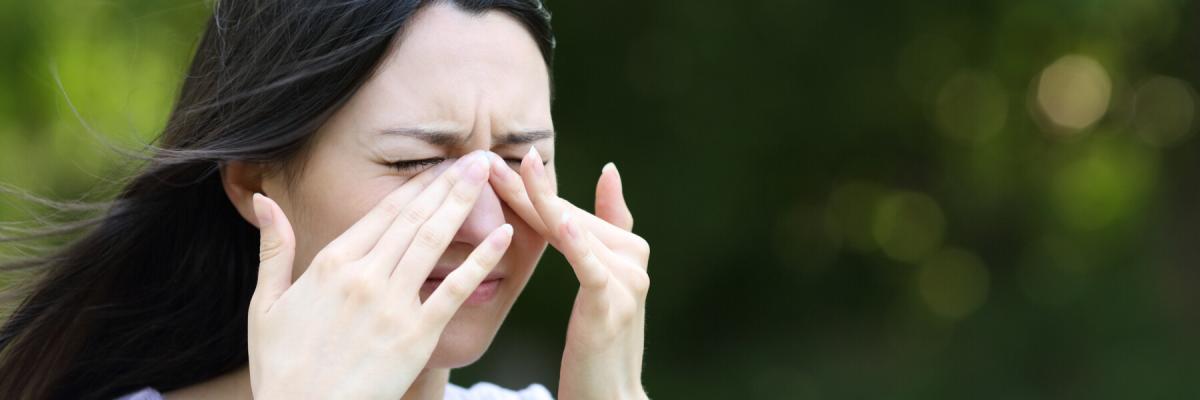
Many people experience a sensation of dry eyes at some point in their lives. This common eye health condition occurs due to many factors, but the quality of the weather and the air around us is one of the most frequent offenders. Dry eye, when chronic and attributed to a direct cause, is considered a diagnosable eye health problem. Dry eye is also highly treatable. Let’s explore how dry air can affect your eye health and what to do if you experience this issue.
Air Quality and Eye Health
Those of us who live in the Boise area are used to experiencing fairly dry, arid weather nearly year-round. Hot summers and cold winters also make spending frequent time inside dry, climate controlled buildings a regular part of life. Between these two factors, dry eye is a likely outcome for many folks. So, how do our eyes become dry when exposed to dry air?
Our eyes are made up of several layers of protective film, which produces a teary barrier that normally keeps our corneas moist and comfortable. These layers are the watery aqueous layer, the oily lipid layer, and the innermost mucus layer. Each time you blink, your eyes redistribute a thin layer of tears to help keep your vision clear and free of irritants. However, if the air quality surrounding you lacks moisture, the protective films covering your eye will evaporate, leading to low quality tears. Add to that dry air a gust of wind carrying dust or debris, and you're bound to experience eye discomfort. This discomfort, as caused by dry air and leading to chronically dry eyes, may be diagnosed as dry eye syndrome.
Symptoms of Dry Eye From Air Quality
It's likely that your eye health matters to you - that’s why you’re here! You probably notice when your eyes don’t feel or see their best. If you’ve ever experienced dry eye, you may wonder what to watch for, how to treat it, and whether it will reoccur. Here are the most common symptoms to discuss with your eye doctor:
Blurred Vision
Without adequate moisture, your eyes lenses can have difficulty focusing on objects in the distance or nearer by. Seeing at night may also be an issue common with dry eye. If you rub your eyes frequently as a result of their dry, irritated sensation, you may make the blurred vision even more apparent.
Glare Sensitivity
Not only is focusing and seeing at night made difficult by dry eye, but seeing in the light can become an issue, too. You may notice that the drier your eyes become, the more difficult it is to cope with bright light. You may even develop headaches in the eye area.
Burning Sensations
Your eyes may feel increasingly hot and itchy during arid weather or too much dry indoor air exposure. This burning or itching may tempt you to itch and rub your eyes. However, the more you rub at your eyes, the more irritated they may become. Your eyes may become red, both in the whites of the eyes and in the delicate skin surrounding your eyes. Not a good look!
Tears or Discharge
Instead of healthy, lubricated tears, a person experiencing dry eye syndrome may instead get a discharge of thick mucus from their tear ducts. This is because, without a normally functioning triple layer of moisture, your eye has to work harder to keep dust, debris, and even infection-causing bacteria from sticking to the surface of the cornea. Discharge is the only way for your eye to attempt to cleanse itself.
If any of the above symptoms are a regular occurrence for you, it may be time to talk to your eye doctor. Untreated dry eye syndrome can result in more frequent irritation, leading to abrasions on the eyes or susceptibility to infections. Headaches can also become unwelcome but regular guests. There’s no need to suffer due to uncontrollably dry air. Let’s take a look at some common treatment options next.
Treatments for Dry Eye
There are simple at-home fixes you can experiment with, like using humidifiers and eliminating fans that blow directly on your face. You should also wear sunglasses outdoors to protect your eyes from dust and debris on the dry wind, as well as from harmful UV exposure.
Here are some more treatment options for dry eye syndrome:
- Artificial tears—over-the-counter or prescription strength
- Corticosteroid eye creams
- Omega-3 supplements
- Prescription oral medications
- In-office BlephEx treatments
- Punctal plugs
- Heat masks
- Contact lenses
Sometimes, your eye health will improve on its own once the dry air changes to more favorable humidity levels. However, you shouldn’t sacrifice your comfort and vision while merely waiting for the seasons to change.
Make sure you discuss your interest in any of the above treatment options with your eye doctor. It may take some experimentation to find an artificial tear that works well for you, and it will take some time for Omega-3 supplements to take effect. Even though these are available without prescription, it is always best to confirm the use of any new product with an eye health expert.
Dry eye can be caused by many factors besides dry air, and can also lead to developing additional conditions that your optometrist may need to screen for.
Diagnosing Dry Eye
If you are experiencing dry, irritated eyes and want to conquer the effects of dry air on your eye health once and for all, we can help you. In order to mitigate your symptoms and experience long-lasting relief, diagnosing your dry eye syndrome is the first step. Once we rule out any other eye health conditions, we’ll tailor the ideal approach to achieving moist, happy eyes with clear vision and well-functioning tears. You may not be able to change the weather in Boise - but you can change your approach to the dry eyes that come with it. Make an appointment today.
